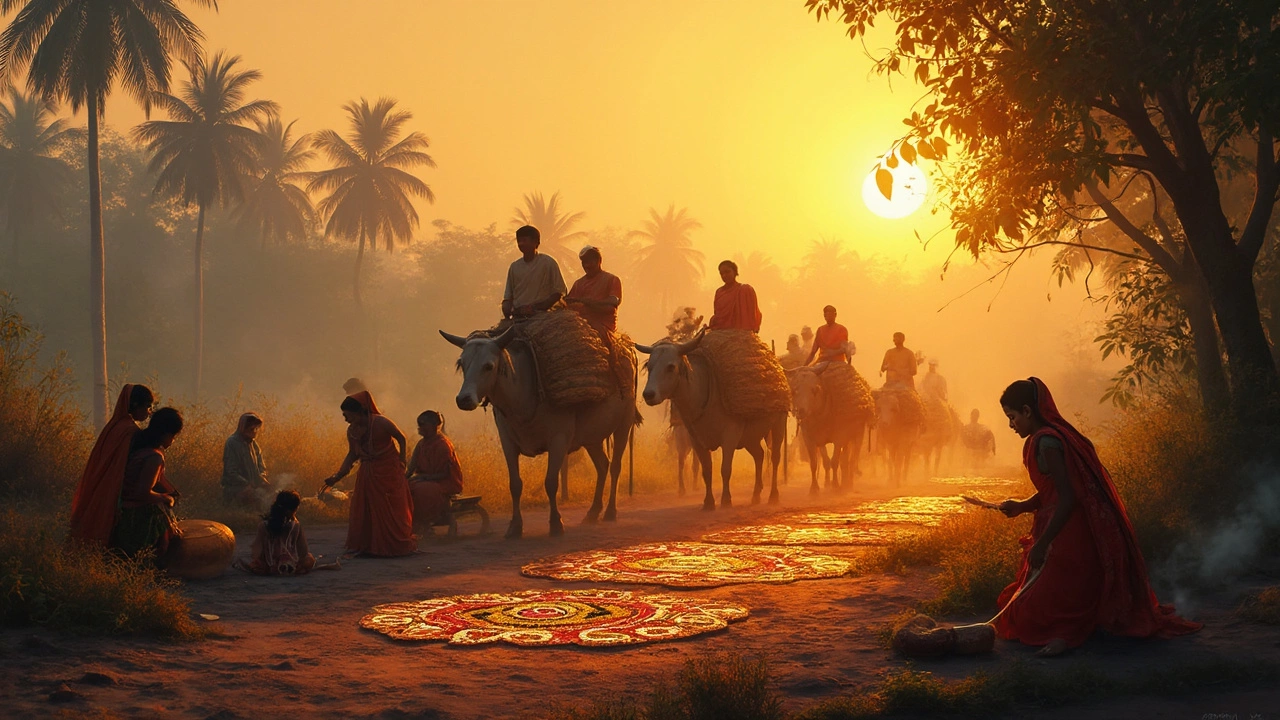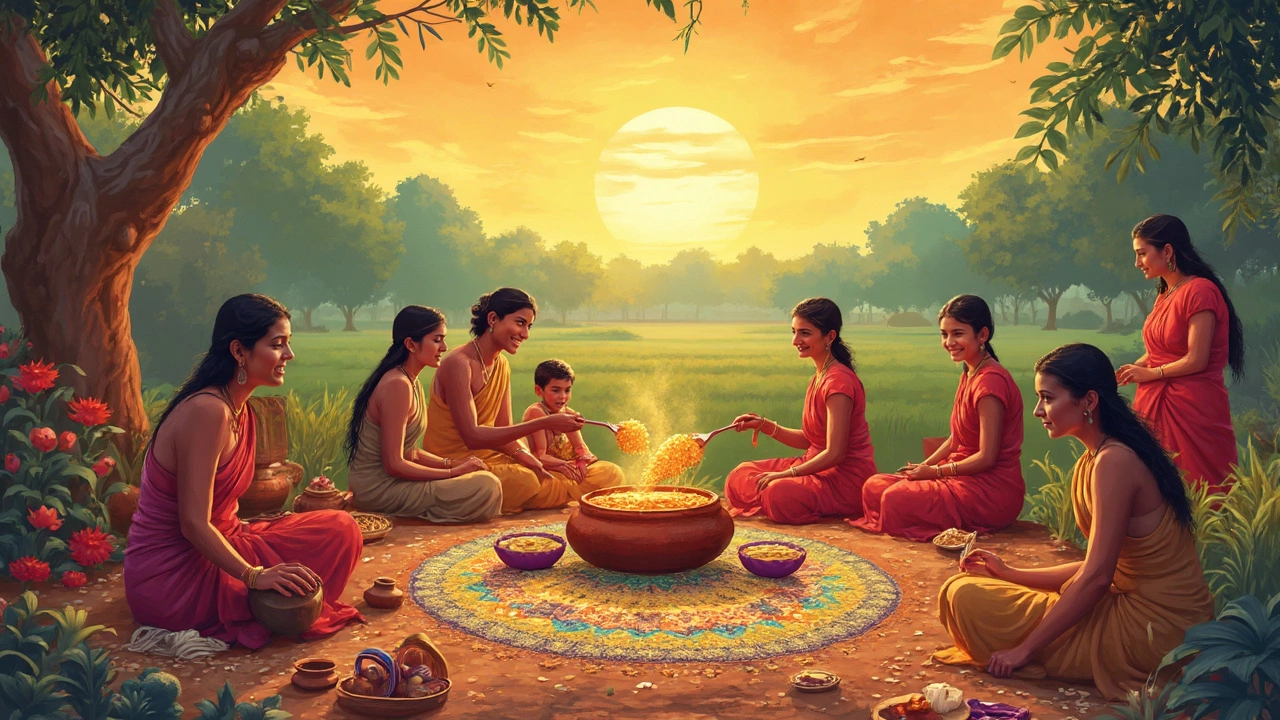Pongal, without a doubt, steals the spotlight when we talk about Tamil Nadu's vibrant celebrations. This is not just a festival; it's a tradition that spans four days, showing off everything Tamil Nadu stands for—community, gratitude, and joy. It's like Thanksgiving due to its harvest theme but is uniquely Tamil in spirit and execution.
The festival's name, 'Pongal,' means 'to boil over,' symbolizing abundance and prosperity. As the sun shifts into the Makara Rashi, families across the state prepare for this grand event. The main focus? Saying thanks for the bountiful harvest we so eagerly wait for each year.
What's intriguing is how involved everyone gets in the preparation—families come together to create beautiful kolams (those intricate rice flour designs) early in the morning. It’s like a community art project that brightens up every street. Plus, these designs aren’t just for show. They’re believed to bring prosperity to the home.
The Essence of Pongal
Pongal is more than just a festival in Tamil Nadu—it's an emotional celebration deeply rooted in tradition and agriculture. Taking place in January, this delightful event coincides with the start of the Thai month in the Tamil calendar, a period believed to bring new opportunities.
The festival is dedicated to the Sun God, Surya, acknowledging the vital role the sun plays in agriculture. This age-old festival spans four days, each with its unique significance and set of rituals, reflecting the agrarian way of life. Families clean and decorate their homes to welcome prosperity.
"Pongal epitomizes the gratitude we offer to nature and its bounty. It's a time when people come together to share their joy and bond over the harvest," - Dr. S. Balasubramanian, cultural historian.
The first day, Bhogi Pongal, kicks off the celebrations by paying respects to Lord Indra, the deity of rain. People discard old belongings, symbolizing new beginnings. Next comes Thai Pongal, the main day, marked by boiling freshly harvested rice in milk until it swells and spills over, symbolizing abundance. This ritual is central and typically conducted in open spaces with family gatherings around.
The third day is Mattu Pongal, where farmers honor their cattle, recognizing their role in farming. Cows are bathed, dressed in garlands, and given special treats. Finally, Kaanum Pongal sees families visiting relatives, seeking blessings from elders, and enjoying a day of relaxation and picnic-like fun.
What Makes Pongal Unique?
The emphasis on community and gratitude makes Pongal truly special. As cities turn into vivid canvases with colorful kolams, communal harmony and neighborly spirit become evident. Food is a key element, with dishes like ven pongal and sweet pongal bringing people together. Pongal dishes are cooked with traditional ingredients, showcasing simplicity and richness in flavors.
Rituals and Traditions
Pongal isn't just about celebrating; it’s deeply rooted in Tamil Nadu's culture and way of life. Every ritual, every tradition tells a part of the Tamil story.
Day 1: Bhogi Pongal
The festivities kick off with Bhogi Pongal. This day is all about letting go of the old and ringing in the new. Houses get a thorough cleaning, and in a symbolic gesture, old clothes and items are sometimes burned to signify new beginnings.
Day 2: Surya Pongal
Surya Pongal is the main day of the festival, dedicated to Surya, the Sun God. On this day, families wake up early and prepare a special dish called 'Pongal' made from freshly harvested rice, milk, and jaggery. The ritual of letting the pot boil over is meant to bring prosperity. Battling each other on who could make the best kolam outside their homes is another tradition that lights up the day.
Day 3: Mattu Pongal
The third day, Mattu Pongal, is quite special, especially for the Tamil Nadu farmers. It’s a day to thank the cattle, particularly cows, who play a crucial role in agriculture. Cows are bathed, decorated with colorful beads, bells, and flowers, and offered a feast.
Day 4: Kaanum Pongal
Kaanum Pongal is when families unwind. It’s a day for visiting relatives and friends, reinforcing community ties. A custom of feeding the leftovers from the Pongal feast to birds is practiced, showing respect and harmony with nature.
Traditional Games
To add fun to this culturally rich festival, traditional games like Jallikattu, a popular bull-taming event, are organized. These games are not just about entertainment but also about reflecting the bravery and strength associated with the Tamil culture.
All these rituals together are a reminder of the simple joys in life and the importance of thanking nature for its bounty.

Significance of Kolams
Kolams are not just decorative art; they're a vital part of Tamil Nadu's Pongal celebration. These intricate designs, crafted using rice flour, adorn the entryways of homes during the festival. But why rice flour? It's simple: rice flour serves a dual purpose. It looks pretty and invites ants, birds, and other creatures for a feast, symbolizing harmony with nature.
The tradition of drawing kolams is old—way older than you might think. It's believed to be a 5,000-year-old custom passed down through generations. Early in the morning, just as the sun is about to rise, women sprinkle water on the ground to prepare it. Then they map out these designs freehand. Pretty impressive, right?
Meaning and Variations
So, what's the deal with the designs? Well, kolams are more than just pretty pictures. They hold aesthetic value and are also a means to ward off negative energies. The patterns range from simple geometric shapes to complex designs inspired by nature.
While each design carries its local flavors and traditions, certain themes are universal. Lotus flowers, fish, and cows often appear, reflecting the agricultural roots of Tamil traditions. The complexity and size vary, reflecting the artist's skill level and the time they have on hand. It's a real mix of skill and creativity.
Community and Learning
Parents, especially mothers, pass down kolam drawing to their children, making it a family affair. You might see kids mimic their parents, adding their little patterns. This shared practice fosters a sense of belonging and teaches the younger generation about their cultural heritage.
Kolams are significant during Pongal, but they're drawn daily in Tamil Nadu. The daily kolams are smaller, simpler versions, while festival kolams tend to be larger and more elaborate. This everyday practice reaffirms its cultural significance and spiritual importance.
So, next time you see a kolam, know that it's not just about decoration. It's a reflection of Tamil Nadu's harmonious relationship with nature and a beautiful exercise in creativity and community bonding.
Pongal's Culinary Delights
Alright, let's talk about food, because that's where everyone's attention is, especially during Pongal. The whole festival comes with its own set of mouth-watering dishes, each holding a special place in everyone's heart, and stomach!
Sweet Pongal
It’s impossible to think of Pongal without picturing a steaming pot of sweet Pongal (or 'Sakkarai Pongal' as the locals call it). This dish is the star of the festival, made from freshly harvested rice, moong dal, jaggery, and lots of ghee. Toss in some cashews and raisins, and you've got a dish that's not just tasty, but steeped in tradition too. It's like spoonfuls of pure bliss.
Savory Pongal
If you're in the mood for something less sweet but equally delicious, we're looking at Ven Pongal, the savory cousin of sweet Pongal. It's a comfort food favorite, especially enjoyed with coconut chutney and sambar. Made from rice and moong dal, flavored with black pepper, ginger, and cumin seeds, it's a simple yet heartening dish.
A Table of Traditional Delights
But it doesn't stop at Pongal. Here's a sneak peek into some of the other festival favorites. These dishes complete the culinary experience during the Tamil Nadu festival:
| Dish Name | Main Ingredients | Taste Profile |
|---|---|---|
| Curd Rice | Rice, Curd, Mustard Seeds | Cool and Soothing |
| Lemon Rice | Rice, Lemon, Turmeric | Tangy and Fragrant |
| Payasam | Rice, Milk, Jaggery | Sweet and Creamy |
Each of these dishes reflects the ingenuity and love that goes into Tamil traditions, making sure no one's taste buds are left behind!
For anyone who gets the chance to celebrate Pongal in Tamil Nadu, diving into these culinary delights is an absolute must—the food alone is worth the trip!
